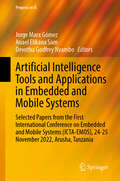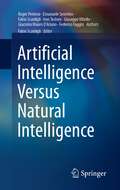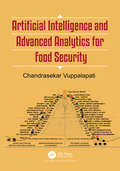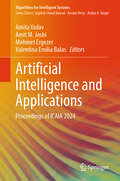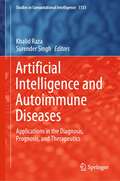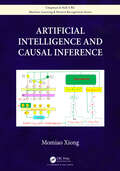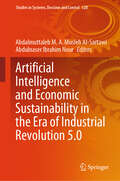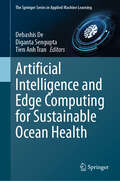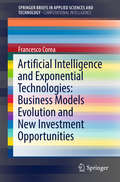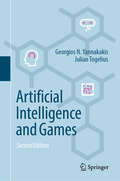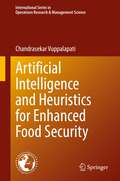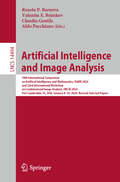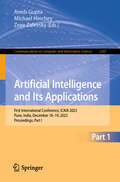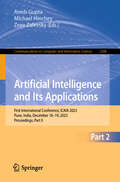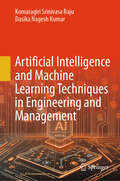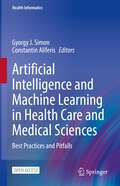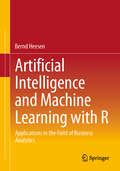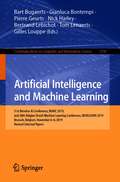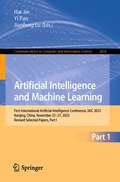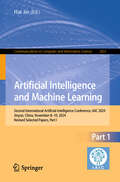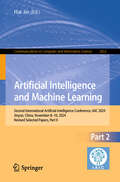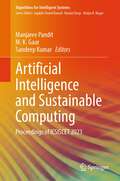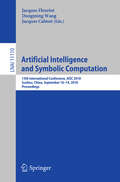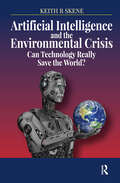- Table View
- List View
Artificial Intelligence Tools and Applications in Embedded and Mobile Systems: Selected Papers from the First International Conference on Embedded and Mobile Systems (ICTA-EMOS), 24-25 November 2022, Arusha, Tanzania (Progress in IS)
by Jorge Marx Gómez Anael Elikana Sam Devotha Godfrey NyamboThe emergence of Artificial Intelligence (AI) has had a tremendous impact on embedded and mobile systems. This book presents a diverse collection of papers that showcase cutting-edge research and practical applications of AI in this field. The peer-reviewed research articles stem from the First International Conference on Embedded and Mobile Systems (ICTA-EMOS), which was held on November 24th – 25th, 2022, in Arusha, Tanzania, East Africa. They demonstrate the breadth and depth of AI’s impact across various domains, exploring topics such as healthcare advances, transportation optimization, sustainable solutions, and business and process optimization.
Artificial Intelligence Versus Natural Intelligence
by Roger Penrose Emanuele Severino Ines Testoni Fabio Scardigli Giuseppe Vitiello Federico Faggin Giacomo Mauro D'ArianoThis book centers around a dialogue between Roger Penrose and Emanuele Severino about one of most intriguing topics of our times, the comparison of artificial intelligence and natural intelligence, as well as its extension to the notions of human and machine consciousness.Additional insightful essays by Mauro D'Ariano, Federico Faggin, Ines Testoni, Giuseppe Vitiello and an introduction of Fabio Scardigli complete the book and illuminate different aspects of the debate. Although from completely different points of view, all the authors seem to converge on the idea that it is almost impossible to have real "intelligence" without a form of "consciousness". In fact, consciousness, often conceived as an enigmatic "mirror" of reality (but is it really a mirror?), is a phenomenon under intense investigation by science and technology, particularly in recent decades. Where does this phenomenon originate from (in humans, and perhaps also in animals)? Is it reproducible on some "device"? Do we have a theory of consciousness today? Will we arrive to build thinking or conscious machines, as machine learning, or cognitive computing, seem to promise? These questions and other related issues are discussed in the pages of this work, which provides stimulating reading to both specialists and general readers.The Chapter "Hard Problem and Free Will: An Information-Theoretical Approach" is available open access under a Creative Commons Attribution 4.0 International License via link.springer.com.
Artificial Intelligence and Advanced Analytics for Food Security
by Chandrasekar VuppalapatiClimate change, increasing population, food-versus-fuel economics, pandemics, etc. pose a threat to food security to unprecedented levels. It has fallen upon the practitioners of agriculture and technologists of the world to innovate and become more productive to address the multi-pronged food security challenges. Agricultural innovation is key to managing food security concerns. The infusion of data science, artificial intelligence (AI), advanced analytics, satellites data, geospatial data, climatology, sensor technologies, and climate modeling with traditional agricultural practices such as soil engineering, fertilizers use, and agronomy are some of the best ways to achieve this. Data science helps farmers to unravel patterns in fertilizer pricing, equipment usage, transportation and storage costs, yield per hectare, and weather trends to better plan and spend resources. AI enables farmers to learn from fellow farmers to apply best techniques that are transferred learning from AI to improve agricultural productivity and to achieve financial sustainability. Sensor technologies play an important role in getting real-time farm field data and provide feedback loops to improve overall agricultural practices and can yield huge productivity gains. Advanced Analytics modeling is essential software technique that codifies farmers’ tacit knowledge such as better seed per soil, better feed for dairy cattle breed, or production practices to match weather pattern that was acquired over years of their hard work to share with worldwide farmers to improve overall production efficiencies, the best antidote to food security issue. In addition to the paradigm shift, economic sustainability of small farms is a major enabler of food security. The book reviews all these technological advances and proposes macroeconomic pricing models that data mines macroeconomic signals and the influence of global economic trends on small farm sustainability to provide actionable insights to farmers to avert any financial disasters due to recurrent economic crises.
Artificial Intelligence and Applications: Proceedings of ICAIA 2024 (Algorithms for Intelligent Systems)
by Valentina Emilia Balas Amita Yadav Amit M. Joshi Mehmet ErgezerThe papers in this book are high quality refereed papers presented at ICAIA 2024, the second International conference on Artificial Intelligence and Applications, held at Maharaja Surajmal Institute of Technology, New Delhi in collaboration with Wentworth Institute of Technology, Boston, USA in March 2024. This book presents new and innovative developments and applications in machine learning, data mining, neural networks, computation optimisation technologies, followed by research applications in signals, language and classification, prediction, recommendations, and systems. This book is essential for researchers and practitioners in this field.
Artificial Intelligence and Autoimmune Diseases: Applications in the Diagnosis, Prognosis, and Therapeutics (Studies in Computational Intelligence #1133)
by Khalid Raza Surender SinghThe book provides an overview of various autoimmune disorders and how artificial intelligence (AI) and machine learning will be used for the diagnosis, prognosis, and treatment of these disorders. AI algorithms are used to create synthetic patient populations with the properties of actual patient cohorts, build personalized predictive models of drug combinations and unravel complex relationships between diet, microbiome, and genetic line-up to determine the comparative treatment response. The book highlights clinical applications and challenges of AI for the diagnosis and treatment/management of autoimmune disorders which includes Rheumatoid Arthritis (RA), Multiple Sclerosis (MS), Type I Diabetes, Psoriatic Arthritis (PsA), and other critical diseases.
Artificial Intelligence and Causal Inference
by Momiao XiongArtificial Intelligence and Causal Inference address the recent development of relationships between artificial intelligence (AI) and causal inference. Despite significant progress in AI, a great challenge in AI development we are still facing is to understand mechanism underlying intelligence, including reasoning, planning and imagination. Understanding, transfer and generalization are major principles that give rise intelligence. One of a key component for understanding is causal inference. Causal inference includes intervention, domain shift learning, temporal structure and counterfactual thinking as major concepts to understand causation and reasoning. Unfortunately, these essential components of the causality are often overlooked by machine learning, which leads to some failure of the deep learning. AI and causal inference involve (1) using AI techniques as major tools for causal analysis and (2) applying the causal concepts and causal analysis methods to solving AI problems. The purpose of this book is to fill the gap between the AI and modern causal analysis for further facilitating the AI revolution. This book is ideal for graduate students and researchers in AI, data science, causal inference, statistics, genomics, bioinformatics and precision medicine. Key Features: Cover three types of neural networks, formulate deep learning as an optimal control problem and use Pontryagin’s Maximum Principle for network training. Deep learning for nonlinear mediation and instrumental variable causal analysis. Construction of causal networks is formulated as a continuous optimization problem. Transformer and attention are used to encode-decode graphics. RL is used to infer large causal networks. Use VAE, GAN, neural differential equations, recurrent neural network (RNN) and RL to estimate counterfactual outcomes. AI-based methods for estimation of individualized treatment effect in the presence of network interference.
Artificial Intelligence and Digital Twin Technology: 1st International Conference, IconAIDTT 2023, Sivakasi, India, April 26–28, 2023, Proceedings (Communications in Computer and Information Science #1972)
by Utku Kose Bui Thanh Hung Kottilingam Kottursamy Valarmathi K. Ramathilagam A. Sankarganesh SeeniThis book constitutes papers from the 1st International Conference on Artificial Intelligence and Digital Twin Technology, IconAIDTT 2023, held in Sivakasi, India, April 26–28, 2023. The 12 full papers and the 1 short paper included in this volume were carefully reviewed and selected from 41 submissions. The papers cover the following topics: Advanced AI and IoT Solutions for Environmental, Healthcare, and Security Challenges; Deep Learning Techniques for Wireless networks and Data Analysis.
Artificial Intelligence and Economic Sustainability in the Era of Industrial Revolution 5.0 (Studies in Systems, Decision and Control #528)
by Abdalmuttaleb M. A. Musleh Al-Sartawi Abdulnaser Ibrahim NourIndustry 5.0 has been dubbed as the digital revolution with a soul. This book incorporates a wealth of research which integrates artificial intelligence (AI) with economic sustainability and Industry 5.0. It examines the human-centricity of the upcoming digital revolution and the role of sustainable technologies in enhancing the livelihoods of workers, individuals, communities, and eventually societies. It provides insight on important areas related to artificial intelligence, sustainable development, and society 5.0. The chapters present a wide range of topics including block cipher, entrepreneurship and AI, AI and stock trading decisions, digital transformation, knowledge management, chatbot engineering, cybersecurity, and smart metering system. This book is beneficial to scholars and academics who will find in it the knowledge of the support of AI and its contribution to economic sustainability, and solutions to enhance human-centricity and resilience.
Artificial Intelligence and Edge Computing for Sustainable Ocean Health (The Springer Series in Applied Machine Learning)
by Debashis De Tien Anh Tran Diganta SenguptaArtificial Intelligence and Edge Computing for Sustainable Ocean Health explores the transformative role of AI and edge computing in preserving and enhancing ocean health. The growing influence of Artificial Intelligence (AI), along with the Internet of Things (IoT) in generating wide coverage of sensor networks, and Edge Computing (EC) has paved the way for investigation of underwater as well as massive marine data, thereby generating huge potential for credible research opportunities for these domains. This book’s journey begins with a broad overview of Artificial Intelligence for Sustainable Ocean Health, setting the foundation for understanding AI's potential in marine conservation. The subsequent chapter, Role of Artificial Intelligence and Technologies in Improving Ocean Health in Promoting Tourism, illustrates the synergy between technological advancements and sustainable tourism practices, demonstrating how AI can enhance the attractiveness and preservation of marine destinations. The identification, restoration, and monitoring of marine resources along with the utilization of technology continues in Utilization of Underwater Wireless Sensor Network through Supervising a Random Network Environment in the Ocean Environment has been extensively dealt with. The technical challenges of underwater imaging, essential for accurate data collection and analysis has been discussed. The importance of Explainable AI is discussed in chapters like Sustainable Development Goal 14: Explainable AI (XAI) for Ocean Health, Explainable AI (XAI) for Ocean Health: Exploring the Role of Explainable AI in Enhancing Ocean Health, and A Comprehensive Study of AI (XAI) for Ocean Health Monitoring, which emphasize transparency and trust in AI systems. Further, Revolutionizing Internet of Underwater Things with Federated Learning, Underwater Drone, Underwater Imagery with AI/ML and IoT in ROV Technology and Ocean Cleanup has been demonstrated using innovative approaches to addressing underwater challenges. The book also includes a Review on the Optics and Photonics in Environmental Sustainability, focusing on the role of optics in marine conservation. Security issues are tackled in Intelligent Hash Function Based Key-Exchange Scheme for Ocean Underwater Data Transmission, and the overarching potential of AI in marine resource management is discussed in Artificial Intelligence as Key-enabler for Safeguarding the Marine Resources.
Artificial Intelligence and Exponential Technologies: Business Models Evolution and New Investment Opportunities (SpringerBriefs in Applied Sciences and Technology)
by Francesco CoreaArtificial Intelligence is a huge breakthrough technology that is changing our world. It requires some degrees of technical skills to be developed and understood, so in this book we are going to first of all define AI and categorize it with a non-technical language. We will explain how we reached this phase and what historically happened to artificial intelligence in the last century. Recent advancements in machine learning, neuroscience, and artificial intelligence technology will be addressed, and new business models introduced for and by artificial intelligence research will be analyzed. Finally, we will describe the investment landscape, through the quite comprehensive study of almost 14,000 AI companies and we will discuss important features and characteristics of both AI investors as well as investments. This is the "Internet of Thinks" era. AI is revolutionizing the world we live in. It is augmenting the human experiences, and it targets to amplify human intelligence in a future not so distant from today. Although AI can change our lives, it comes also with some responsibilities. We need to start thinking about how to properly design an AI engine for specific purposes, as well as how to control it (and perhaps switch it off if needed). And above all, we need to start trusting our technology, and its ability to reach an effective and smart decision.
Artificial Intelligence and Games
by Julian Togelius Georgios N. YannakakisThis book covers artificial intelligence methods applied to games, both in research and game development. It is aimed at graduate students, researchers, game developers, and readers with a technical background interested in the intersection of AI and games. The book covers a range of AI methods, from traditional search, planning, and optimization, to modern machine learning methods, including diffusion models and large language models. It discusses applications to playing games, generating content, and modeling players, including use cases such as level generation, game testing, intelligent non-player characters, player retention, player experience analysis, and game adaptation. It also covers the use of games, including video games, to test and benchmark AI algorithms. The book is informed by decades of research and practice in the field and combines insights into game design with deep technical knowledge from the authors, who have pioneered many of the methods and approaches used in the field. This second edition of the 2018 textbook captures significant developments in AI and gaming over the past 7 years, incorporating advancements in computer vision, reinforcement learning, deep learning, and the emergence of transformer-based large language models and generative AI. The book has been reorganized to provide an updated overview of AI in games, with separate sections dedicated to AI’s core uses in playing and generating games, and modeling their players, along with a new chapter on ethical considerations. Aimed at readers with foundational AI knowledge, the book primarily targets three audiences: graduate or advanced undergraduate students pursuing careers in game AI, AI researchers and educators seeking teaching resources, and game programmers interested in creative AI applications. The text is complemented by a website featuring exercises, lecture slides, and additional educational materials suitable for undergraduate and graduate courses.
Artificial Intelligence and Heuristics for Enhanced Food Security (International Series in Operations Research & Management Science #331)
by Chandrasekar VuppalapatiThis book introduces readers to advanced data science techniques for signal mining in connection with agriculture. It shows how to apply heuristic modeling to improve farm-level efficiency, and how to use sensors and data intelligence to provide closed-loop feedback, while also providing recommendation techniques that yield actionable insights. The book also proposes certain macroeconomic pricing models, which data-mine macroeconomic signals and the influence of global economic trends on small-farm sustainability to provide actionable insights to farmers, helping them avoid financial disasters due to recurrent economic crises. The book is intended to equip current and future software engineering teams and operations research experts with the skills and tools they need in order to fully utilize advanced data science, artificial intelligence, heuristics, and economic models to develop software capabilities that help to achieve sustained food security for future generations.
Artificial Intelligence and Image Analysis: 18th International Symposium on Artificial Intelligence and Mathematics, ISAIM 2024, and 22nd International Workshop on Combinatorial Image Analysis, IWCIA 2024, Fort Lauderdale, FL, USA, January 8–10, 2024, Revised Selected Papers (Lecture Notes in Computer Science #14494)
by Reneta P. Barneva Valentin E. Brimkov Claudio Gentile Aldo PacchianoThis book constitutes the refereed joint proceedings of the 18th International Symposium on Artificial Intelligence and Mathematics, ISAIM 2024, and the 22nd International Workshop on Combinatorial Image Analysis, IWCIA 2024, held in Fort Lauderdale, FL, USA, during January 8–10, 2024. The 14 full papers presented were carefully reviewed and selected from 25 submissions. The papers cover topics from AI, theoretical computer science, mathematics, medicine, robotics, defense, and security.
Artificial Intelligence and Its Applications: First International Conference, ICAIA 2023, Pune, India, December 18-19, 2023, Proceedings, Part I (Communications in Computer and Information Science #2307)
by Zeev Zalevsky Michael Hinchey Anish GuptaThis book constitutes the refereed proceedings of the First International Conference on Artificial Intelligence and its Applications, ICAIA 2023, held in Pune, India, during December 18–19, 2023. The 37 full papers and 3 short papers presented in these two volumes were carefully reviewed and selected from 217 submissions. The conference focused on three primary domains: Use of AI in Health Care; Machine Vision and Image Processing; Automated and Digital Manufacturing Systems.
Artificial Intelligence and Its Applications: First International Conference, ICAIA 2023, Pune, India, December 18-19, 2023, Proceedings, Part II (Communications in Computer and Information Science #2308)
by Zeev Zalevsky Michael Hinchey Anish GuptaThis book constitutes the refereed proceedings of the First International Conference on Artificial Intelligence and its Application, ICAIA 2023, held in Pune, India, during December 18–19, 2023. The 37 full papers and 3 short papers presented in these two volumes were carefully reviewed and selected from 217 submissions. The conference focused on three primary domains: Use of AI in Health Care; Machine Vision and Image Processing; Automated and Digital Manufacturing Systems.
Artificial Intelligence and Machine Learning Techniques in Engineering and Management
by Komaragiri Srinivasa Raju Dasika Nagesh KumarThe present book covers various facets of Artificial Intelligence, Machine Learning, and Fuzzy Logic. It includes a brief discussion on performance indicators, Classical and Advanced Machine Learning algorithms, Fuzzy logic-based modelling algorithms, Emerging Research Areas, including Blockchain, recent ML techniques, Evolutionary Algorithms, Large Language Model (LLM)-based Generative AI, the Internet of Things, Big Data, Decision Support Systems, Taguchi design of experiments, data augmentation, and Cross-Validation, and representative case studies. The appendix covers representative AI tools, data sources, books, and journals on AI. The present book can support undergraduate, postgraduate, and Ph.D. students in Artificial Intelligence, Generative Artificial Intelligence, Machine Learning, Data Sciences, Soft Computing, and Fuzzy Logic in Engineering and Management and allied fields. The proposed book has immense value in the interdisciplinary and cross-disciplinary context.
Artificial Intelligence and Machine Learning in Health Care and Medical Sciences: Best Practices and Pitfalls (Health Informatics)
by Constantin Aliferis Gyorgy J. SimonThis open access book provides a detailed review of the latest methods and applications of artificial intelligence (AI) and machine learning (ML) in medicine. With chapters focusing on enabling the reader to develop a thorough understanding of the key concepts in these subject areas along with a range of methods and resulting models that can be utilized to solve healthcare problems, the use of causal and predictive models are comprehensively discussed. Care is taken to systematically describe the concepts to facilitate the reader in developing a thorough conceptual understanding of how different methods and resulting models function and how these relate to their applicability to various issues in health care and medical sciences. Guidance is also given on how to avoid pitfalls that can be encountered on a day-to-day basis and stratify potential clinical risks. Artificial Intelligence and Machine Learning in Health Care and Medical Sciences: Best Practices and Pitfallsis a comprehensive guide to how AI and ML techniques can best be applied in health care. The emphasis placed on how to avoid a variety of pitfalls that can be encountered makes it an indispensable guide for all medical informatics professionals and physicians who utilize these methodologies on a day-to-day basis. Furthermore, this work will be of significant interest to health data scientists, administrators and to students in the health sciences seeking an up-to-date resource on the topic.
Artificial Intelligence and Machine Learning with R: Applications in the Field of Business Analytics
by Bernd HeesenIn a VUCA world, which is becoming increasingly volatile, uncertain, and complex, companies, organizations, and states must respond promptly and adequately to the respective situations. Making decisions based on past experiences is less successful in these times than having an accurate understanding of current conditions. The importance of empirical sciences, continuous environmental observation, timely analysis of causal relationships, and deriving new insights from them is increasing. From this, it can be deduced which measures are likely to achieve one's goals with predictable probability, such as which price for an offer generates the desired demand or which marketing measure reaches the desired target group. Where classical statistics were once used for calculations and predictions, today free (open source) tools like R allow data in various formats and from any number of sources to be read in, processed, and analyzed using methods of Artificial Intelligence and Machine Learning. The results can then be perfectly visualized so that decision-makers can benefit quickly and effectively. The age of Data Science has arrived. Digitalization is more than a buzzword or a promise; it is actionable and usable for everyone. This book teaches you, based on the latest version of R at the time of publication, how to use Artificial Intelligence and Machine Learning in Industry 4.0.
Artificial Intelligence and Machine Learning: 31st Benelux AI Conference, BNAIC 2019, and 28th Belgian-Dutch Machine Learning Conference, BENELEARN 2019, Brussels, Belgium, November 6-8, 2019, Revised Selected Papers (Communications in Computer and Information Science #1196)
by Bart Bogaerts Gianluca Bontempi Pierre Geurts Nick Harley Bertrand Lebichot Tom Lenaerts Gilles LouppeThis book contains a selection of the best papers of the 31st Benelux Conference on Artificial Intelligence, BNAIC 2019, and 28th Belgian Dutch Machine Learning Conference, BENELEARN 2019, held in Brussels, Belgium in November 2019. The 11 papers presented in this volume were carefully reviewed and selected from 50 regular submissions. They address various aspects of artificial intelligence such as natural language processing, agent technology, game theory, problem solving, machine learning, human-agent interaction, AI and education, and data analysis.
Artificial Intelligence and Machine Learning: First International Artificial Intelligence Conference, IAIC 2023, Nanjing, China, November 25–27, 2023, Revised Selected Papers, Part I (Communications in Computer and Information Science #2058)
by Yi Pan Hai Jin Jianfeng LuThis 3-volume set, CCIS 2058-2060 constitutes the First International Conference, on Artificial Intelligence, IAIC 2023, held in Nanjing, China, in November 2023. The 85 full papers presented were carefully reviewed and selected from 428 submissions. The papers are clustered in parts on: Artificial Intelligence and Machine Learning; Data Security and information Security; Computer Networks and IoT. The papers present recent research and developments in artificial intelligence and its applications in machine learning, natural language processing, computer vision, robotics, and ethical considerations.
Artificial Intelligence and Machine Learning: Second International Artificial Intelligence Conference, IAIC 2024, Jinyun, China, November 8–10, 2024, Revised Selected Papers, Part I (Communications in Computer and Information Science #2451)
by Hai JinThis CCIS volume constitutes the refereed proceedings of Second International Artificial Intelligence Conference on Artificial Intelligence and Machine Learning, IAIC 2024, held in Jinyun, China, November 2024. The 38 full papers presented were carefully reviewed and selected from 100 submissions.They were organized in following topical sections as follows: Part I : Artificial Intelligence in Real-World Applications.Part II : Artificial Intelligence in Network and Security systems.
Artificial Intelligence and Machine Learning: Second International Artificial Intelligence Conference, IAIC 2024, Jinyun, China, November 8–10, 2024, Revised Selected Papers, Part II (Communications in Computer and Information Science #2452)
by Hai JinThis CCIS volume constitutes the refereed proceedings of Second International Artificial Intelligence Conference on Artificial Intelligence and Machine Learning, IAIC 2024, held in Jinyun, China, November 2024. The 38 full papers presented were carefully reviewed and selected from 100 submissions.They were organized in following topical sections as follows: Part I : Artificial Intelligence in Real-World Applications.Part II : Artificial Intelligence in Network and Security systems.
Artificial Intelligence and Sustainable Computing: Proceedings of ICSISCET 2023 (Algorithms for Intelligent Systems)
by Sandeep Kumar Manjaree Pandit M. K. GaurThis book presents high-quality research papers presented at the 5th International Conference on Sustainable and Innovative Solutions for Current Challenges in Engineering and Technology (ICSISCET 2023) held at Madhav Institute of Technology & Science (MITS), Gwalior, India, during October 21–22, 2023. The book extensively covers recent research in artificial intelligence (AI) that knit together nature-inspired algorithms, evolutionary computing, fuzzy systems, computational intelligence, machine learning, deep learning, etc., which is very useful while dealing with real problems due to their model-free structure, learning ability, and flexible approach. These techniques mimic human thinking and decision-making abilities to produce systems that are intelligent, efficient, cost-effective, and fast. The book provides a friendly and informative treatment of the topics which makes this book an ideal reference for both beginners and experienced researchers.
Artificial Intelligence and Symbolic Computation: 13th International Conference, AISC 2018, Suzhou, China, September 16–19, 2018, Proceedings (Lecture Notes in Computer Science #11110)
by Jacques Fleuriot Dongming Wang Jacques CalmetThis book constitutes the refereed proceedings of the 13th International Conference on Artificial Intelligence and Symbolic Computation, AISC 2018, held in Suzhou, China, in September 2018. The 13 full papers presented together with 5 short and 2 invited papers were carefully reviewed and selected from 31 submissions. The AISC conference is an important forum when it comes to ensuring that ideas, theoretical insights, methods and results from traditional AI can be discussed and showcased, while fostering new links with other areas of AI such as probabilistic reasoning and deep learning.
Artificial Intelligence and the Environmental Crisis: Can Technology Really Save the World?
by Keith Ronald SkeneA radical and challenging book which argues that artificial intelligence needs a completely different set of foundations, based on ecological intelligence rather than human intelligence, if it is to deliver on the promise of a better world. This can usher in the greatest transformation in human history, an age of re-integration. Our very existence is dependent upon our context within the Earth System, and so, surely, artificial intelligence must also be grounded within this context, embracing emergence, interconnectedness and real-time feedback. We discover many positive outcomes across the societal, economic and environmental arenas and discuss how this transformation can be delivered.Key Features: Identifies a key weakness in current AI thinking, that threatens any hope of a better world. Highlights the importance of realizing that systems theory is an essential foundation for any technology that hopes to positively transform our world. Emphasizes the need for a radical new approach to AI, based on ecological systems. Explains why ecosystem intelligence, not human intelligence, offers the best framework for AI. Examines how this new approach will impact on the three arenas of society, environment and economics, ushering in a new age of re-integration.
